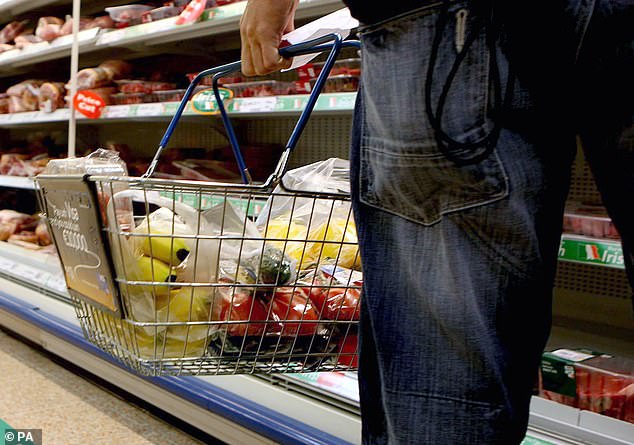Shop prices rose by just 0.8 per cent this month in a sign that inflation has been ‘brought to heel’, industry figures show.
The year-on-year increase, down from 1.3 per cent in March, was the lowest since December 2021 and non-food prices actually fell, the British Retail Consortium (BRC) said.
It is the latest sign that the cost-of-living crisis is subsiding, adding to hopes that the Bank of England may soon be able to cut interest rates.
The figures come just over a year after shop price rises hit a peak of 8.9 per cent in March 2023.
‘Shop price inflation levels are showing signs of normalising, providing relief to households,’ said BRC chief executive Helen Dickinson.

Inflation fight: Shop prices rose by just 0.8% this month, the lowest since December 2021 and down from 1.3% in March
Cost of living pressures intensified in 2022 after Russia’s invasion of Ukraine pushed up food and energy prices.
The BRC’s gauge showed food price inflation reaching a painful 15.7 per cent a year ago. It has now fallen to 3.4 per cent.
Non-food inflation hit 5.9 per cent in March last year but has now fallen to minus 0.6 per cent – meaning prices are lower than a year ago. It was last negative in December 2021.
Dickinson said promotional offers for clothes and footwear were behind the non-food price fall.
Lower prices for fresh products such as butter, fish and fruit helped food inflation dip, she added.
However, turmoil in the Middle East could mean more volatility.
‘While consumers will welcome the lower shop price inflation, geopolitical tensions and the knock-on impact on commodity prices, like oil, pose a threat to future price stability,’ Dickinson said.
A separate report yesterday suggested prices of some staples could come under pressure as a result over the unusually damp weather in the UK over the autumn and winter.
That could result in harvests falling by a fifth compared to the average over recent years, driving up the cost of bread, beer and biscuits, according to the Energy and Climate Intelligence Unit (ECIU).
Elsewhere, supermarket Asda’s income tracker showed that with wages growing more quickly than price rises, family spending power has continued to increase.
It rose to an average to £233 a week in March, £21.50 higher than a year earlier and the 12th month in a row of growth.
The official inflation rate – which soared to 11.1 per cent a year-and-a-half ago – has fallen sharply over the past year and dropped to 3.2 per cent in March.
The measure, which incorporates a broader range of goods and services than the shop price index, is expected to have dipped to around 2 per cent, the Bank of England’s target, this spring.










